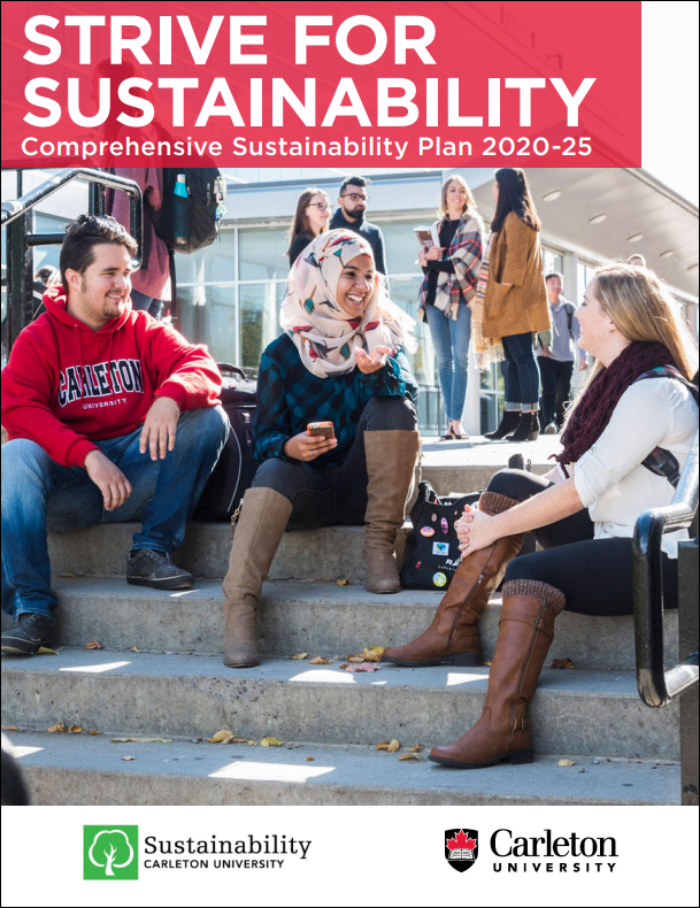Strive for Sustainability - Comprehensive Sustainability Plan
Carleton University released an updated version of its Sustainability Plan, Strive for Sustainability, for 2020-2025. The plan builds upon our existing work and the strength we have shown in this field, which has enabled Carleton to become a leader in environmental and sustainability action.
To date, from an operations viewpoint, this has meant a 35% reduction in our carbon emissions and zero waste certifications for dining. In teaching, we have seen an increasing focus on sustainability in our undergraduate and graduate programs, and in research, our work has included the development of the Centre for Advanced Building Envelope Research and the Human Building Interaction Lab.
The Sustainability Plan was developed with community participation and leadership engagement to identify key themes, which are included in the final version. This engagement highlighted the need for a more holistic plan than our previous strategy, as well as the need to demonstrate social and real-world impact.
The plan includes six key themes:
Leadership, Teaching and Learning, Research, Operations, Community Engagement, Sustainable Collaboration
This expands our strategy beyond a solely operational focus and ensures that Carleton embeds sustainability across all of its diverse departments. We encourage everyone to review the plan and consider how their work and actions can make a difference in our community. Let’s all strive for sustainability and build a more sustainable future.
You can view the full plan here or by clicking the image above.
A shorter version of key themes and actions can be viewed here
The Sustainability Plan supports several other plans on our campus and is aligned with third-party certifications and reporting, including the UN Sustainable Development Goals, AASHE STARS, and UI Green Metric.
You can read more about the Carleton University Strategic Integrated Plan and the importance of Sustainability as one of three key directions here.
We are committed to reporting annually on our progress.
The most recent annual report can be found here.
LEADERSHIP:
Demonstrate sustainable leadership
We are committed to demonstrating leadership by integrating sustainability principles into our day-to-day decision-making and activities.

TEACHING AND LEARNING:
Inspire and support students to be sustainability literate
We will continue to strengthen sustainability within teaching and learning programs and practices and by promoting sustainability literacy and engagement among all members of our community.

RESEARCH:
Sustainability research with real-world impact
We will prioritize collaborative interdisciplinary research that addresses the social, environmental, and economic dimensions of sustainability, with a focus on generating real-world impact.
OPERATIONS:
Reducing the impact from our operations
We acknowledge the environmental impact of our operations and will continue to work towards a future where we exemplify sustainable best practices.
COMMUNITY ENGAGEMENT:
Engaging and inspiring our community
We will drive improvements toward sustainability through the active involvement and engagement of all members of our university community.
SUSTAINABLE COLLABORATION:
Work beyond our boundaries and advocate for sustainability
We will embrace participation and the strengthening of relationships beyond our internal community to catalyze change.
LEADERSHIP
• Achieve zero instances of sustainability and environmental legal non-compliance
• Attain a Gold STARS rating by 2021 – completed and award in 2022
• Report annually and publicly on the university’s sustainability impacts and progress
TEACHING AND LEARNING
• Track the number of courses and programs that enable students to understand and apply sustainability knowledge
• Ensure that all students graduating from Carleton have exposure to sustainability principles through their degree program or wider initiatives
RESEARCH
• Track the number of research programs and initiatives with links to campus sustainability operations and planning
• Increase the number of communications on university sustainability research provided to the broader community
OPERATIONS
• Achieve a 50% reduction in Scope 1 and 2 carbon emissions by 2030, and 100% by 2050 (based on a 2005 baseline).
• Increase the number of renewable or alternative energy projects on campus
• Achieve annual reductions in energy consumption (electricity and gas)
• Maintain a minimum 4 Green Globe rating (or equivalent external third-party sustainable certification) for all new builds or major renovations
• Achieve a zero-waste campus with a diversion rate of over 90%
• Increase the number of university-owned electric vehicles
• Increase the percentage of locally sourced and sustainably sourced foods




